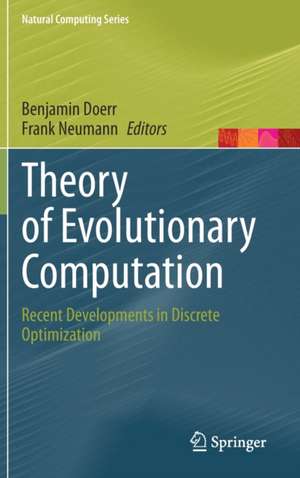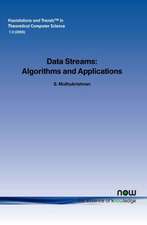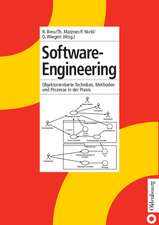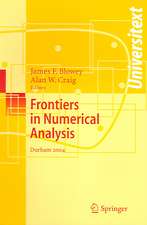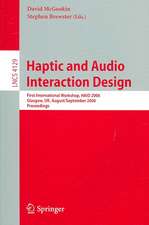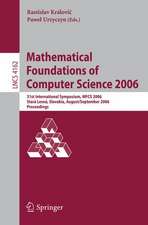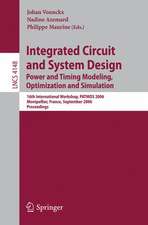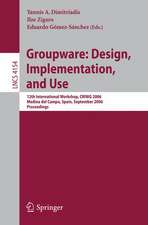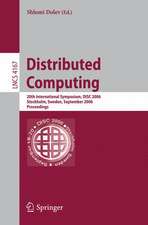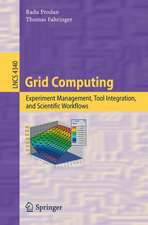Theory of Evolutionary Computation: Recent Developments in Discrete Optimization: Natural Computing Series
Editat de Benjamin Doerr, Frank Neumannen Limba Engleză Hardback – 4 dec 2019
It starts with two chapters on mathematical methods that are often used in the analysis of randomized search heuristics, followed by three chapters on how to measure the complexity of a search heuristic: black-box complexity, a counterpart of classical complexity theory in black-box optimization; parameterized complexity, aimed at a more fine-grained view of the difficulty of problems; and the fixed-budget perspective, which answers the question of how good a solution will be after investing a certain computational budget. The book then describes theoretical results on three important questions in evolutionary computation: how to profit from changing the parameters during the run of an algorithm; how evolutionary algorithms cope with dynamically changing or stochastic environments; and how population diversity influencesperformance. Finally, the book looks at three algorithm classes that have only recently become the focus of theoretical work: estimation-of-distribution algorithms; artificial immune systems; and genetic programming.
Throughout the book the contributing authors try to develop an understanding for how these methods work, and why they are so successful in many applications. The book will be useful for students and researchers in theoretical computer science and evolutionary computing.
| Toate formatele și edițiile | Preț | Express |
|---|---|---|
| Paperback (1) | 1453.92 lei 6-8 săpt. | |
| Springer International Publishing – 3 dec 2020 | 1453.92 lei 6-8 săpt. | |
| Hardback (1) | 1460.52 lei 6-8 săpt. | |
| Springer International Publishing – 4 dec 2019 | 1460.52 lei 6-8 săpt. |
Din seria Natural Computing Series
- 20%
 Preț: 507.38 lei
Preț: 507.38 lei - 20%
 Preț: 305.91 lei
Preț: 305.91 lei - 20%
 Preț: 992.26 lei
Preț: 992.26 lei - 20%
 Preț: 617.14 lei
Preț: 617.14 lei - 20%
 Preț: 645.47 lei
Preț: 645.47 lei - 20%
 Preț: 642.65 lei
Preț: 642.65 lei - 20%
 Preț: 998.04 lei
Preț: 998.04 lei - 18%
 Preț: 963.60 lei
Preț: 963.60 lei - 20%
 Preț: 655.20 lei
Preț: 655.20 lei - 20%
 Preț: 615.70 lei
Preț: 615.70 lei - 20%
 Preț: 645.65 lei
Preț: 645.65 lei - 20%
 Preț: 640.19 lei
Preț: 640.19 lei - 20%
 Preț: 655.02 lei
Preț: 655.02 lei -
 Preț: 384.70 lei
Preț: 384.70 lei - 20%
 Preț: 652.54 lei
Preț: 652.54 lei - 20%
 Preț: 649.28 lei
Preț: 649.28 lei - 20%
 Preț: 330.75 lei
Preț: 330.75 lei - 20%
 Preț: 328.09 lei
Preț: 328.09 lei -
 Preț: 389.70 lei
Preț: 389.70 lei - 20%
 Preț: 644.66 lei
Preț: 644.66 lei - 20%
 Preț: 333.88 lei
Preț: 333.88 lei - 20%
 Preț: 1299.31 lei
Preț: 1299.31 lei - 20%
 Preț: 528.47 lei
Preț: 528.47 lei - 20%
 Preț: 648.11 lei
Preț: 648.11 lei - 15%
 Preț: 639.90 lei
Preț: 639.90 lei - 20%
 Preț: 322.43 lei
Preț: 322.43 lei - 20%
 Preț: 657.83 lei
Preț: 657.83 lei - 20%
 Preț: 659.31 lei
Preț: 659.31 lei - 20%
 Preț: 997.56 lei
Preț: 997.56 lei - 20%
 Preț: 508.61 lei
Preț: 508.61 lei -
 Preț: 400.85 lei
Preț: 400.85 lei - 20%
 Preț: 653.38 lei
Preț: 653.38 lei - 20%
 Preț: 308.60 lei
Preț: 308.60 lei - 20%
 Preț: 654.05 lei
Preț: 654.05 lei - 15%
 Preț: 652.17 lei
Preț: 652.17 lei - 20%
 Preț: 336.54 lei
Preț: 336.54 lei - 20%
 Preț: 656.19 lei
Preț: 656.19 lei
Preț: 1460.52 lei
Preț vechi: 1825.65 lei
-20% Nou
Puncte Express: 2191
Preț estimativ în valută:
279.56€ • 303.77$ • 234.98£
279.56€ • 303.77$ • 234.98£
Carte tipărită la comandă
Livrare economică 21 aprilie-05 mai
Preluare comenzi: 021 569.72.76
Specificații
ISBN-13: 9783030294137
ISBN-10: 3030294137
Ilustrații: XII, 506 p. 27 illus., 17 illus. in color.
Dimensiuni: 155 x 235 mm
Greutate: 0.92 kg
Ediția:1st ed. 2020
Editura: Springer International Publishing
Colecția Springer
Seria Natural Computing Series
Locul publicării:Cham, Switzerland
ISBN-10: 3030294137
Ilustrații: XII, 506 p. 27 illus., 17 illus. in color.
Dimensiuni: 155 x 235 mm
Greutate: 0.92 kg
Ediția:1st ed. 2020
Editura: Springer International Publishing
Colecția Springer
Seria Natural Computing Series
Locul publicării:Cham, Switzerland
Cuprins
Probabilistic Tools for the Analysis of Randomized Optimization Heuristics.- Drift Analysis.- Complexity Theory for Discrete Black-Box Optimization Heuristics.- Parameterized Complexity Analysis of Randomized Search Heuristics.- Analysing Stochastic Search Heuristics Operating on a Fixed Budget.- Theory of Parameter Control for Discrete Black-Box Optimization: Provable Performance Gains Through Dynamic Parameter Choices.- Analysis of Evolutionary Algorithms in Dynamic and Stochastic Environments.- The Benefits of Population Diversity in Evolutionary Algorithms: A Survey of Rigorous Runtime Analyses.- Theory of Estimation-of-Distribution Algorithms.- Theoretical Foundations of Immune-Inspired Randomized Search Heuristics for Optimization.- Computational Complexity Analysis of Genetic Programming.
Textul de pe ultima copertă
This edited book reports on recent developments in the theory of evolutionary computation, or more generally the domain of randomized search heuristics.
It starts with two chapters on mathematical methods that are often used in the analysis of randomized search heuristics, followed by three chapters on how to measure the complexity of a search heuristic: black-box complexity, a counterpart of classical complexity theory in black-box optimization; parameterized complexity, aimed at a more fine-grained view of the difficulty of problems; and the fixed-budget perspective, which answers the question of how good a solution will be after investing a certain computational budget. The book then describes theoretical results on three important questions in evolutionary computation: how to profit from changing the parameters during the run of an algorithm; how evolutionary algorithms cope with dynamically changing or stochastic environments; and how population diversity influencesperformance. Finally, the book looks at three algorithm classes that have only recently become the focus of theoretical work: estimation-of-distribution algorithms; artificial immune systems; and genetic programming.
Throughout the book the contributing authors try to develop an understanding for how these methods work, and why they are so successful in many applications. The book will be useful for students and researchers in theoretical computer science and evolutionary computing.
It starts with two chapters on mathematical methods that are often used in the analysis of randomized search heuristics, followed by three chapters on how to measure the complexity of a search heuristic: black-box complexity, a counterpart of classical complexity theory in black-box optimization; parameterized complexity, aimed at a more fine-grained view of the difficulty of problems; and the fixed-budget perspective, which answers the question of how good a solution will be after investing a certain computational budget. The book then describes theoretical results on three important questions in evolutionary computation: how to profit from changing the parameters during the run of an algorithm; how evolutionary algorithms cope with dynamically changing or stochastic environments; and how population diversity influencesperformance. Finally, the book looks at three algorithm classes that have only recently become the focus of theoretical work: estimation-of-distribution algorithms; artificial immune systems; and genetic programming.
Throughout the book the contributing authors try to develop an understanding for how these methods work, and why they are so successful in many applications. The book will be useful for students and researchers in theoretical computer science and evolutionary computing.
Caracteristici
Many advances have been made in this field in the last ten years Concise summary of the state of the art for graduate students and researchers Book covers the development of more powerful methods, the solution of longstanding open problems, and the analysis of new heuristics
